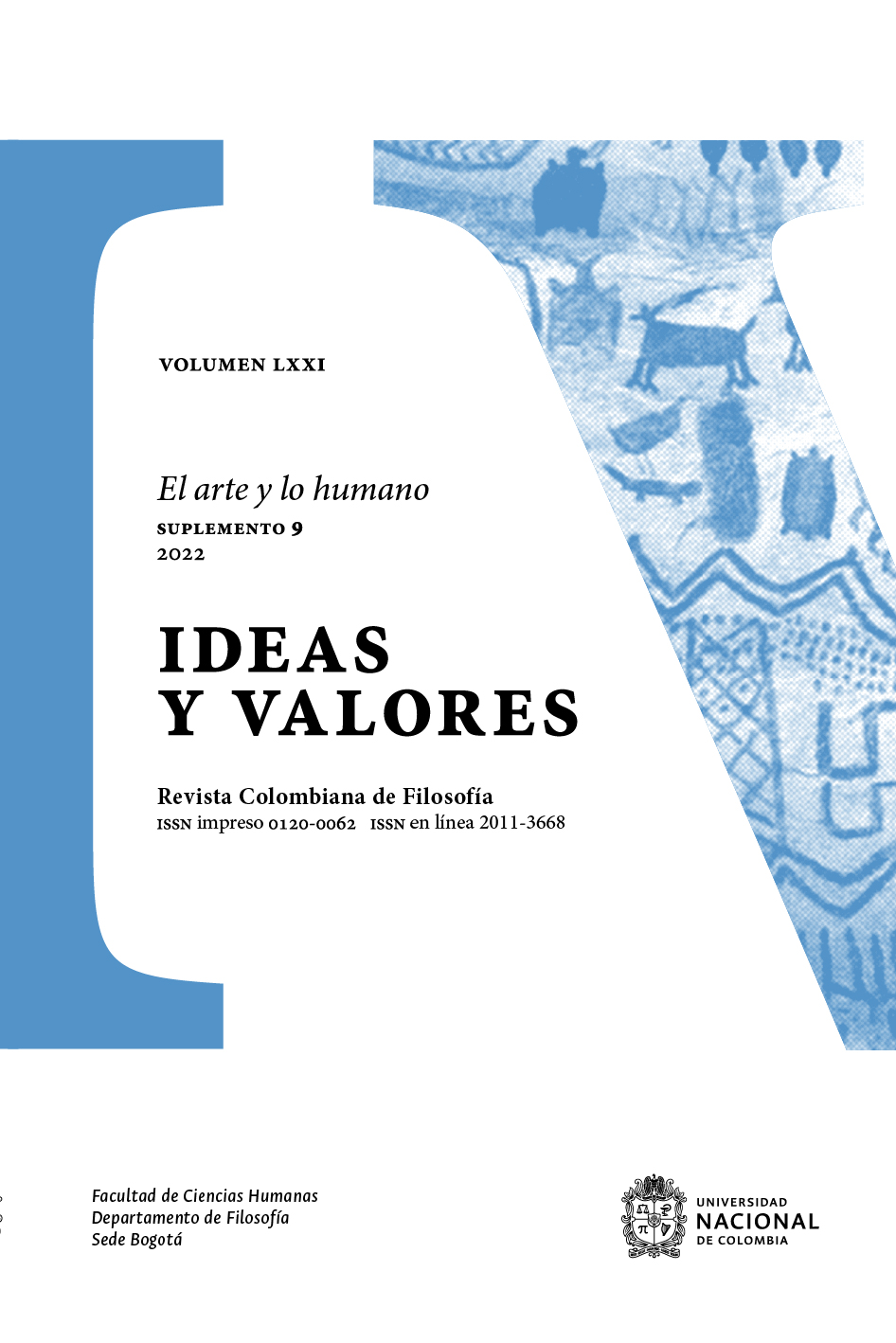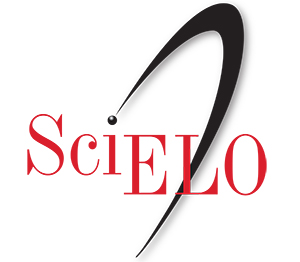Adorno, Hamlet y el factor añadido
Adorno, Hamlet and the Added Factor
DOI:
https://doi.org/10.15446/ideasyvalores.v71n9Supl.106744Keywords:
T. W. Adorno, Hamlet, lo añadido, teoría, praxis (es)T. W. Adorno, Hamlet, addendum, theory, praxis (en)
Downloads
Este artículo tematiza la relevancia del Hamlet, de Shakespeare, para el pensamiento de T. W. Adorno, aun cuando este no haya escrito in extenso sobre aquel. El drama aparece sobre todo en su discurso oral como modelo para describir la relación de discontinuidad entre teoría y práctica. Aquí se desea mostrar cómo el teórico crítico del pensamiento moral abstracto piensa el paso del conocimiento a la praxis a partir del vínculo entre Hamlet y el llamado “factor añadido” (Das Hinzutretende). Desde esta lectura, el Hamlet de Adorno representa un lugar clave de transiciones malogradas.
This article analyzes the great importance of Shakespeare's Hamlet for T. W. Adorno's philosophy, even though he did not write extensively about it. The drama appears mainly in his oral discourse and serves as a model for describing the relationship of discontinuity between theory and practice. Here we wish to show how the critical theorist of abstract moral thought thinks the transition from knowledge to praxis based on the link between Hamlet and the so-called “added factor” (Das Hinzutretende). From this reading, Adorno's Hamlet represents a key site of failed transitions.
References
Adorno, Theodor. Beethoven. Filosofía de la música: Fragmentos y textos. Traducido por Antonio Brotons Muñoz y Antonio Gómez Schneektloth. Akal, 2003.
Adorno, Theodor. “Einleitung in dialektisches Denken: Stichworte zur letzten, abgebrochenen Vorlesung ss 1969.” Frankfurter Adorno Blätter vi. Editado por Theodor W. Adorno. Kritik, 2000. DOI: https://doi.org/10.5771/9783967075151-173
Adorno, Theodor. Gesammelte Schriften. Drei Studien zu Hegel. Edited by Rolf Tiedemann. Vol. 5. Suhrkamp, 1971.
Adorno, Theodor. Gesammelte Schriften. Negative Dialektik. Edited by Rolf Tiedemann. Collaboratión of Gretel Adorno, Susan Buck-Morss Morss and Klaus Schultz. Vol. 8 Suhrkamp, 2003a.
Adorno, Theodor. “Individuum und Organisation.” Gesammelte Schriften: Soziologische Schriften I. Edited by Rolf Tiedemann. Collabaration of Gretel Adorno, Susan Buck- Morss y Klaus Schultz, Vol. 8. Suhrkamp, 2003b.
Adorno, Theodor. Metaphysik. Begriff und Probleme 1965. Edited by Rolf Tiedemann. Suhrkamp, 1998.
Adorno, Theodor. “Notas marginales sobre teoría y praxis.” Consignas. Traducido por Ramón Bilbao. Amorrortu. 1993.
Adorno, Theodor. Problemas de filosofía moral. Traducido por Gustavo Robles. Buenos Aires: Las cuarenta, 2019.
Adorno, Theodor. “Thesen über die Sprache des Philosophen.” Gesammelte Schriften. Philosophische Frühschriften. Editado por Rolf Tiedemann. Vol 1. Frankfurt a.M.: Suhrkamp, 1973.
Adorno, Theodor. “Versuch, das Endspiel zu verstehen.” Gesammelte Schriften. Noten zur Literatur. 1.ª ed. Edited by Rolf Tiedemann. Collaboration of Gretel Adorno, Susan Buck-Morss y Klaus Schultz, Vol. 11. Suhrkamp, 2003c.
Adorno, Theodor W. Zur Lehre von der Geschichte und von der Freiheit (1964/65). Edited by Rolf Tiedemann. Suhrkamp, 2006.
Adorno, Theodor W. y Benjamin, Walter. Briefwechsel 1928 – 1940. Edited by Henri Lonitz. Suhrkamp, 1994.
Benjamin, Walter. El origen del drama barroco alemán. Traducido por José Muñoz Millanes. Taurus, 1990.
Dutschke, Rudi. “Diskussion: Das Verhältnis von Theorie und Praxis (1964).” Frankfurter Schule und Studentenbewegung. Edited by Wolfgang Kraushaar. Vol. 2. Roger & Bernhard bei Zweitausendeins, 1998.
Goebel, Eckart. “Das Hinzutretende. Zu Negativen Dialektik.” Frankfurter Adorno Blätter IV. Text + kritik, 1992.
Hamacher, Werner. Comprender detraído: Estudios acerca de filosofía y literatura, de Kant a Celan. Traducido por Niklas Bornhauser Neuber. Metales Pesados, 2018. DOI: https://doi.org/10.2307/j.ctvckq6vx
Horkheimer, Max. Gesammelte Schriften: Zur Kritik der instrumentellen Vernunft. Edited by Alfred Schmidt und Gunzelin Schmid Noerr. Vol. 6. Fischer, 1991.
Horkheimer, Max. “Traditionelle und kritische Theorie.” Zeitschrift für Sozialforschung. 4 (1937): 245-294. DOI: https://doi.org/10.5840/zfs19376265
Horkheimer, Max y Adorno, Theodor W. Dialektik der Aufklärung. Philosophische Fragmente. Fischer, 2010.
Jaffe, Aaron. “Adorno’s ‘addendum’.” Philosophy and Social Criticism 43 (2017): 1-22. Kant, Immanuel. Crítica de la razón práctica. Traducido por Emilio Miñana Villagrasa y Manuel García Morente. Sígueme, 1997.
Poppitz-Trotman, George. “Adornos Hamlet.” New German Critique 129. 43 (2016): 175-201. Shakespeare, William, “Hamlet.” Tragedias. Traducido por José María Valverde. rba Editores, 1994. DOI: https://doi.org/10.1215/0094033X-3625433
Tiedemann, Rolf. “Hamlet, Eideshelfer des Philosophen: Shakespeares ‘Prince of Denmark’ im Werk Adornos.” Niemandsland: Studien mit und über Theodor W. Adorno. Text + kritik, 2007.
Tiedemann, Rolf. “Nicht die Erste Philosophie sondern eine letzte.” Mythos und Utopie: Aspekte der Adornoschen Philosophie. Text + kritik, 2009.
van Gelder, Frederik. “Adornos Hamlet.” Rolf Tiedemann: Der getreue Editor. Edited by Karel Marcus. Text + kritik, 2019.
How to Cite
MODERN-LANGUAGE-ASSOCIATION
ACM
ACS
APA
ABNT
Chicago
Harvard
IEEE
Turabian
Vancouver
Download Citation
License
Copyright (c) 2023 Los derechos son del autor(es), quien(es) puede re-publicar en parte o en su totalidad el documento ya publicado en la revista siempre y cuando se dé el debido reconocimiento a Ideas y Valores

This work is licensed under a Creative Commons Attribution-NonCommercial-NoDerivatives 4.0 International License.
The Creative Commons Attribution-NonComnercial-No Derivatives 4.0 Internacional License authorizes copying and redistributing the material in any means or format, provided that credit is granted to the authors and to Ideas y Valores as the source of the original publication. Copying or distributing the contents of the journal for commercial purposes is not allowed; neither is the adaptation, derivation, or transformation of the contents, without previous authorization by the authors and the editors of Ideas y Valores. For further information regarding the terms of this license, please consult http://creativecommons.org/licenses/by-nc-nd/4.0/legalcode.







1.jpg)
.png)


1.png)
.png)
.png)
.jpg)

.png)









